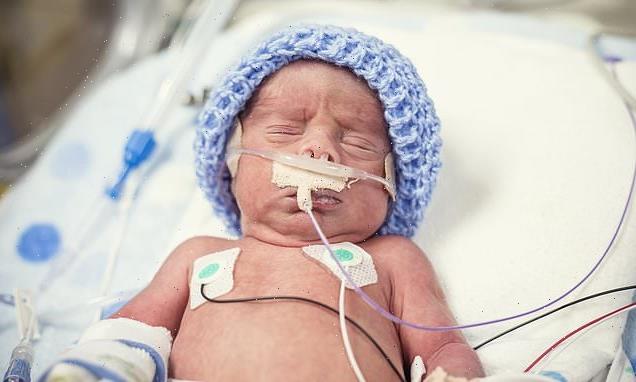
Premature boys age FASTER: By their 30s, men with an extremely low birth weight are biologically nearly five years older than their peers
- Babies born at less than 2 lbs 3 oz have an ‘extremely low birth weight’, or ELBW
- McMaster University experts have been tracking a group of such children
- A special form a DNA analysis was used to study the subjects’ biological ages
- The researchers found that ELBW boys age faster, unlike their female peers
- This may be because boys handle stress around birth differently, the team said
Baby boys born prematurely with an extremely low birth weight (ELBW) age faster than their peers, and, by their 30s, end up biologically nearly five years older.
ELBW babies are those whose birth weights measure in at less than two pounds and three ounces (1 kilogram) and they are typically born at 27 weeks or sooner.
Researchers from Canada’s McMaster University calculated the biological ages of 92 individuals, all aged between 30–35, of whom 45 were born ELBW.
They found that the ELBW men were an average of 4.6 years older, biologically, than those with healthy birth weight — a discrepancy not seen among the women.
According to the team, the more rapid aging may be a result of boys handling physiological stress before and shortly after birth differently to girls.
The findings, they added, suggest that doctors should be encouraging ELBW men to take steps to proactively combat their premature aging.
Measures could include eating a balanced diet, avoiding smoking, getting decent amounts of sleep and exercise and managing stress, according to the team.
Baby boys born prematurely with an extremely low birth weight (ELBW) age faster than their peers, and, by their 30s, end up biologically nearly five years older (stock image)
BIRTH WEIGHTS
High birth weight: > 9 lbs 4 oz
Normal weight: 5 lbs 8 oz – 9 lbs 4 oz
Low birth weight: < 5 lbs 8 oz
Very low birth weight: < 3 lbs 5 oz
Extremely low: < 2 lbs 3 oz
The study was conducted by physician Ryan Van Lieshout of the McMaster University in Hamilton, Canada, and his colleagues.
The investigation forms part of the world’s oldest longitudinal study of ELBW babies, which commenced in 1977 and has been monitoring the ongoing health of its subjects ever since.
The team used DNA analysis to compare the biological ages of 45 of the ELBW individuals with 47 of their normal birth weight peers when both were aged 30–35.
To ensure the best comparison, the researchers controlled for confounding factors like chronic health problems and sensory impairments.
The researchers found that by their thirties, the ELBW men were an average of 4.6 years older, biologically, than their normal birth weight peers.
However, this same discrepancy was not found among women who were similarly born with an extremely low birth weight.
‘Although it is unclear why accelerated biological aging is seen in the ELBW men, this suggests that prenatal exposures play an important role,’ said Dr Van Lieshout.
The findings, he noted, add to previous research that concluded that ELBW boys are more vulnerable to prenatal stresses than similar weight baby girls.
‘This certainly highlights the need to monitor the health of preterm survivors across their lifespan, and more research needs to be done,’ said Dr Van Lieshout.
The findings, he added, ‘also emphasizes the need to forewarn the ELBW men and promote healthy aging so they may proactively mitigate these risks.’
The full findings of the study were published in the journal Pediatrics.
EXPLAINED: PREMATURE BIRTH AND ITS RISKS TO BABIES
Around 10 per cent of all pregnancies worldwide result in premature labour – defined as a delivery before 37 weeks.
When this happens, not all of the baby’s organs, including the heart and lungs, will have developed. They can also be underweight and smaller.
Tommy’s, a charity in the UK, says this can mean preemies ‘are not ready for life outside the womb’.
Premature birth is the largest cause of neonatal mortality in the US and the UK, according to figures.
Babies born early account for around 1,500 deaths each year in the UK. In the US, premature birth and its complications account for 17 per cent of infant deaths.
Babies born prematurely are often whisked away to neonatal intensive care units, where they are looked after around-the-clock.
What are the chances of survival?
- Less than 22 weeks is close to zero chance of survival
- 22 weeks is around 10%
- 24 weeks is around 60%
- 27 weeks is around 89%
- 31 weeks is around 95%
- 34 weeks is equivalent to a baby born at full term
Source: Read Full Article
